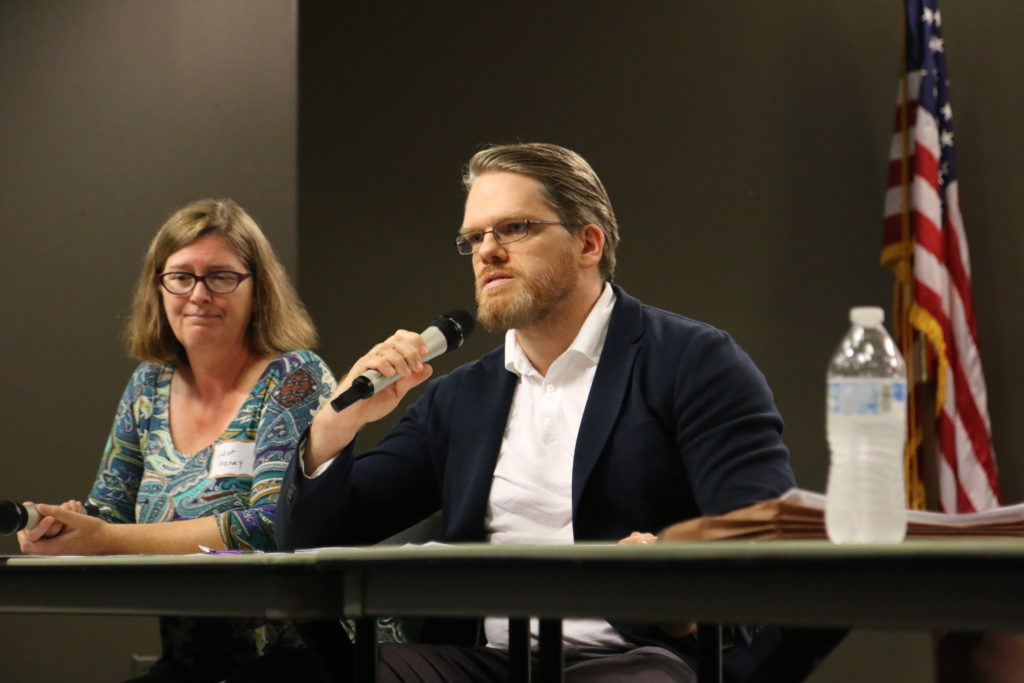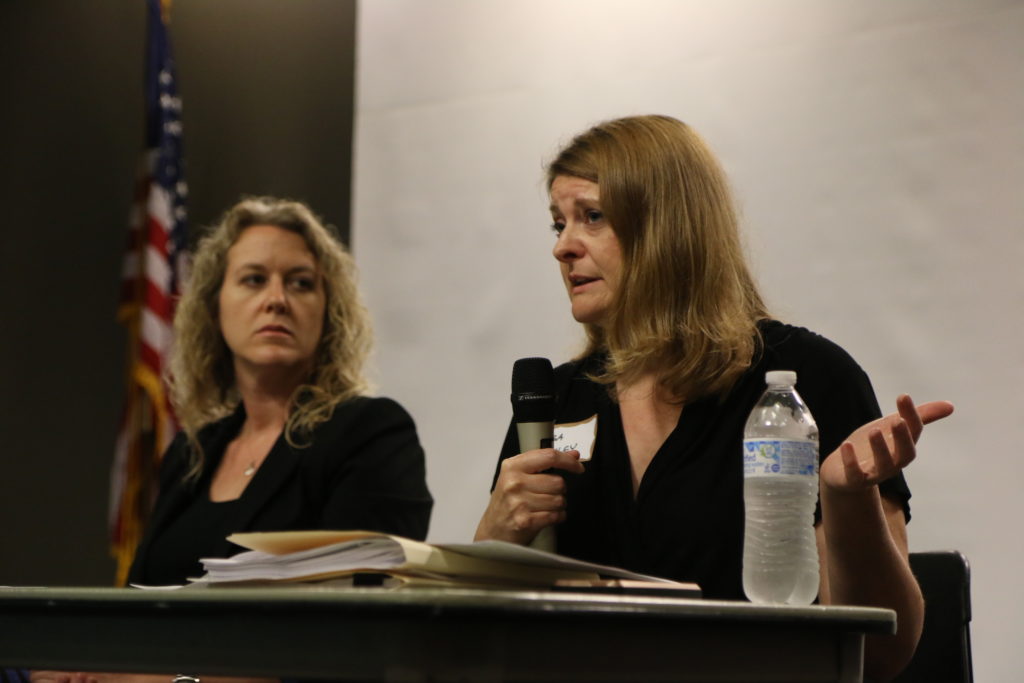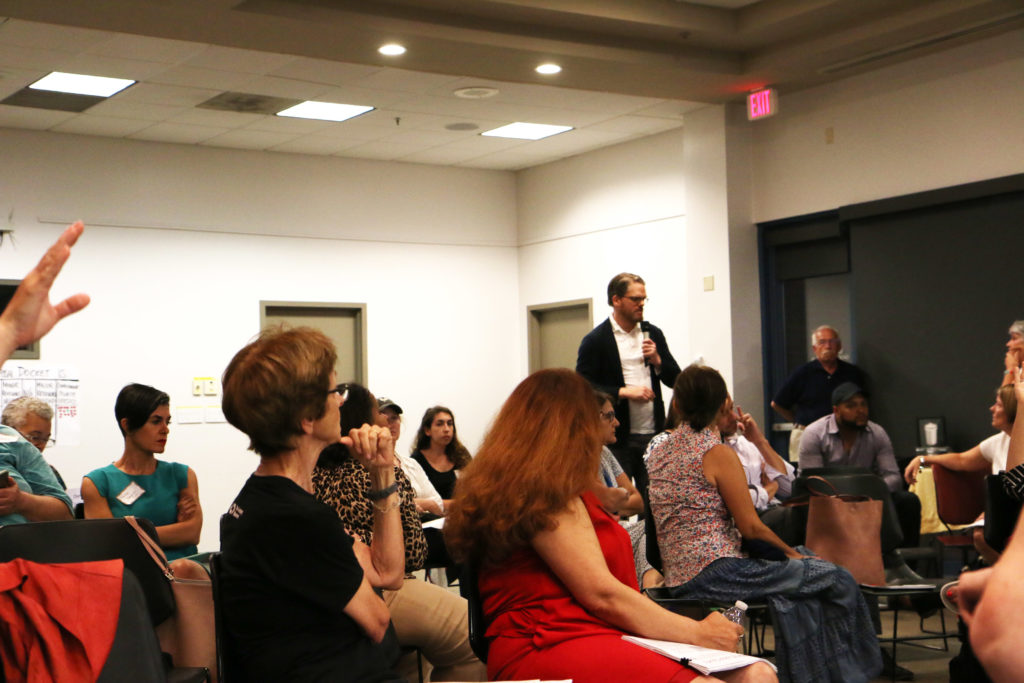Officials and activists are asking the county courts to make a newly-proposed mental health jail diversion program more inclusive.
Arlington and Fairfax public defenders joined several advocates during a Thursday evening meeting about the proposal, and urged county officials to broaden the mental illnesses diagnoses accepted in the program and not require plea bargains as a participation requirement.
Brad Haywood, who leads the Office of the Public Defender for Arlington County and the City of Falls Church, shared a list of changes his office wants the county to make to the proposal before the county submits the application to the Virginia Supreme Court.
Juliet Hiznay, a special education attorney by training, joined him on Thursday to express concern that only some “serious mental illnesses” were considered shoe-ins for the program, which is called the Behavioral Health Docket.
Hiznay said she was worried that people with developmental disabilities (like ADD or autism) could also benefit from the court-supervised treatment plan, but would be considered “exceptions” under the current eligibility criteria.
Much of the evening focused on discussing whether the county should require participants to plead guilty to their charges before participating in the program (as is currently proposed) or allow them to follow the docket program and then have a trail (as Fairfax County does.)
“Because it requires a guilty plea it literally can’t decriminalize mental illness,” said panelist Lisa Dailey, who analyzes and advises mental illness decriminalization policies at the Treatment Advocacy Center. “So if that’s your goal you’re failing right out of the gate.”
When Arlington Assistant Commonwealth’s Attorney Lisa Tingle asked Fairfax Public Defender Dawn Butorac asks whether the Fairfax docket convicts participants of their charges if they fail out of the program, Butorac said Fairfax prosecutors set no such deals.
“Telling your client ‘if you fail this is what we’re going to do’ is sending the wrong message,” Butorac said.
Haywood pointed out that another benefit of nixing the pre-plea requirement was getting people into treatment fast — something not possible if the county’s tedious discovery process slows down the process.
Haywood also noted that requiring pleas to participate in the mental health service could lead innocent people to say they were guilty in order to access services. He acknowledged that was an “extreme” hypothetical but could be avoided if the county followed Fairfax County’s example of only contending with pleas after a participant finishes their docket treatment plan.
“We are much more inclusive than Arlington,” Butorac said of Fairfax’s docket, which was created after a mentally ill woman was tasered. “When we drafted it, we wanted it to be as inclusive as possible.”
The meeting was organized by a group of parents with children affected by mental illness which previously criticized county officials for excluding them from the docket planning process. The activists asked for more time to consider the details of the proposal during a public meeting the Department of Human Services held at their request last month.
Officials are convening another public meeting in the Department of Human Services’ headquarters on Thursday, September 5 from 6-7:30 p.m. on 2100 Washington Blvd.
Last night’s meeting also highlighted future funding challenges with the docket.
Sheriff Beth Arthur said she supported the docket but shared concerns over what a similar “pre-plea” structure would mean for her office. The county has not identified additional funds to cover the cost of running the docket, which she says means her staff will be “picking up a little extra here and little extra there.”
“Frankly our pre-trial program is already bursting at the seams,” she said.
“If that is an impediment, I do think there are workarounds if we talk about it and get creative,” replied Haywood.
“I know for us, we will definitely need additional clinicians to focus on the docket,” added DHS Director Anita Friedman, who reiterated her support for the proposal. “And I’m fully prepared to request those funds from the next budget cycle.”
Several members of the audience were parents of children with mental illnesses, including one woman who asked officials to remember the reason the docket was proposed was to help children like her son — who had been hospitalized seven times last year and incarcerated six times — need help.
“These people are sick,” she said. “You should not treat them like a criminal.”
About fifty people gathered in the auditorium at Arlington Central Library in Virginia Square Thursday night to discuss the proposal, which was first shared publicly in documents obtained by ARLnow.
At the end of the meeting, audience members placed colored stickers on poster boards sharing their thoughts on what level of revisions they felt the county needed to make to its docket proposal. The majority said major revisions were necessary.
Afterward, Friedman said she couldn’t comment on the pre versus post-plea debate as DHS does not speak for the courts. She added that, “the more options for people the better in my opinion. The more options for how you can divert people from the criminal justice system the better.”
Several criminal defense attorneys attended, along with Sheriff Beth Arthur, former Deputy Police Chief James Younger, and Arlington Democratic party leaders Carol Fontein and Cragg Hines. Current Assistant Commonwealth’s Attorney Lisa Tingle and incoming prosecutor Parisa Dehghani-Tafti were present.
Tafti won the June primary for the Commonwealth’s Attorney’s Office in a surprise upset after months of campaigning on reforms such as a mental health docket.
She declined to comment on Thursday about how she thought the meeting went.







